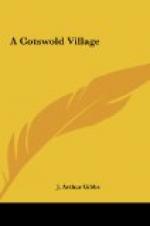So much for the methods by which this William Shakespeare of the hunting field is wont to pursue his fox. But we have not done with him yet. What does he do on those bad scenting days which on the dry and stony Cotswold Hills are the rule rather than the exception? On such days, as well as hunting his fox, he humours his field. In the first place, unless he has distinct proof to the contrary, he invariably gives his fox credit for being a straight-necked one. He keeps moving on at a steady pace in the direction in which his instinct and knowledge lead him, even though there may be no scent, either on the ground or in the air, to guide the hounds. Every piece of good scenting ground—and he knows the capabilities of every field in this respect—is made the most of; “carrying” or dusty ploughs are scrupulously avoided. If he “lifts,” it is done so quietly and cunningly that the majority of the riders are unaware of the fact; and the hounds never become wild and untractable. It is this free and generous method of hunting the fox that pleases his followers. Travess’s casts are not made in cramped and stingy fashion, but a wide extent of country is covered even on a bad day; there is no rat-hunting. After a time all save a dozen sportsmen are left several fields behind. “They won’t run to-day,” is the general cry; “there is no hurry.” But meantime some large grass fields are met with, or the huntsman brings the pack on to better terms with the fox, or maybe a fresh one jumps up, and away go the hounds for seven or eight minutes as hard as they can pelt. Only a dozen men know exactly what has happened. Most of the thrusters and all the liver-men have to gallop in earnest for half an hour to come up with the hunt; indeed, on many days they never see either huntsman or hounds again, and go tearing about the country cursing their luck in missing so fine a run! It is the old story of the hare and the tortoise. But herein lies the “humour” of it: the hare is pleased and the tortoise is pleased. The former, as represented by the field, has enjoyed a fine scamper, and lots of air (bother the currant jelly!) and exercise; the tortoise, on the other hand, has had a fine hunting run, and possibly by creeping slowly on for some hours it has killed its fox; whilst several good sportsmen have enjoyed an old-fashioned hunt in a wild country with a kill in the open.
Verbum sap: If you want to humour your field, you must leave them behind. It must not be done intentionally, however; the riders must be allowed, so to speak, to work out their own salvation in this respect.




